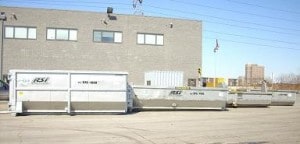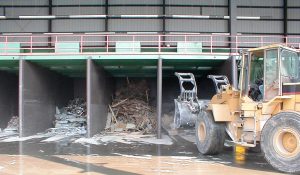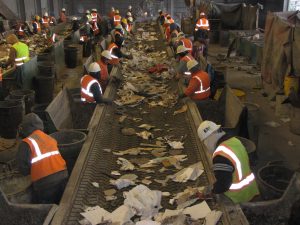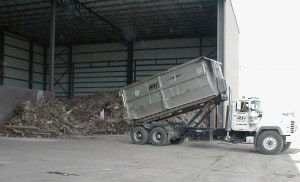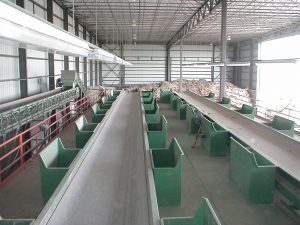In the Spotlight
Recycling Systems, Inc.: Diverting Waste Material from Landfills
By recovering materials at its own facility and reducing waste travel to landfills, RSI is competitive in a marketplace of giants while providing a platform for sustainability and environmental stewardship.
With the rollup of many independent waste haulers in the late 1990s, many construction companies found themselves with few service vendor choices. The family owners of Recycling Systems, Inc. (RSI) (Chicago, IL) had a great working relationship with many of the largest general contractors in the Chicago area (Walsh Construction, Orange Crush, Kiewit Western and others) several of whom suggested they start a waste recycling and hauling company that would offer better service to contractors. With that in mind, RSI started carving out a niche for itself in February of 2000 with two trucks and 40 rolloff boxes. It took five years of constant effort to site, design, permit and finally build the Recycling Systems Material Recovery and Transfer Facility RSI now owns and operates in Chicago. The facility was actually built on a former brownfield site that was reclaimed and repurposed as the first and largest, state-of-the-art material recovery facility of its kind permitted in the city of Chicago.
Jerry Golf and his family who own and operate RSI, decided from the beginning to deal primarily with recyclables from construction and demolition projects so the company would be independent from the “big waste” companies who controlled and owned the landfills in the area. RSI also had the foresight to see the trend toward Green Building and the need for this kind of operation in terms of diverting recyclables from jobsites, salvaging reusable materials, reducing waste travel to landfills and lowering the cost of landfill disposal. By recovering materials at its own facility, RSI is competitive in a marketplace of giants while providing a platform for sustainability and environmental stewardship.
Covering the Chicagoland area—including the counties of Cook, Lake, Dupage, Will, McHenry and Kendall—RSI’s radius extends approximately 30 miles outside of downtown Chicago. The company currently has more than 60 trucks and 1,200 containers and trailers, employs approximately 200 people from the surrounding community and operates 24 hours per day, six days per week. In addition, since 2008, RSI has branched out to provide municipal solid waste hauling and disposal services to their customers.
Adapting to Change
In 2009, construction started plummeting 46 percent to $9.78 billion in the local area, marking the biggest decline in the Chicagoland area since McGraw-Hill began tracking the data in 1967. RSI has combated these stresses by first starting with what the customer wants—service excellence and dollar value. Then, they evaluate their employees and processes to make sure they are giving each customer what he or she wants.In the current state of the economy, RSI has done what it does best—adapt to changing circumstances. “RSI has always been willing to take the lead on ventures and this has proven to be a success in combating the effects of a global economic downturn and a locally depressed construction industry,” says Cal King, General Manager. As a result of the economic downturn, RSI began to diversify its customer base by reaching out to homeowners and smaller contractors instead of focusing on only a few general contractors. It has also concentrated on building its brand and improving internal performance. RSI has created a cohesive brand strategy by making sweeping changes in the way it markets and advertises both the company and its services. Every initiative the company partakes in is in step with the company’s overall vision and philosophy to be the most trusted name in waste hauling. By focusing on a strategy that included re-designing the Web site to make it more user friendly, embracing the social media trend by claiming a presence on outlets such as twitter and facebook, and creating memorable ways to seek out RSI on the Internet with satellite Web sites such as www.rentourbox.com, RSI has been able to stay ahead of the competition and managed to increase some of its revenue streams more than 100 percent despite the country’s economic challenge.
RSI has managed to use various methods in order to “stay ahead of the curve”. One of the most important has been a adopting a one-stop-shop attitude for the company. RSI prides itself on being flexible and finding beneficial solutions for their customer’s complex issues. Early on, some of RSI’s customers expressed a need for specialized containers and experienced drivers to haul and dispose of asbestos waste and contaminated soil in the early phases of project preparation. RSI’s Vice President, Richard Golf, searched for a solution and found a small company for sale that had two trucks, drivers and fifty special containers for this purpose, “We bought the company, solved the needs of our existing customers and brought a whole new set of customers to RSI. We consider customers and employees as an extension of our family. We believe that the harder we work to solve a problem or fill a need the more we can expect to hear from that customer over and over again.”
RSI has also grown to meet the demands of its marketplace. From the start, the facility has extended its hours to stay open 24/7 to help its customers who work through the night and on weekends. RSI was Chicago’s first company to start a “Green Team” made up of sales, operations and L.E.E.D. knowledgeable associates to help contractors understand the best ways to increase recycling and reduce their costs. By introducing and implementing the best environmental practices for these projects, RSI has obtained a reputation for being a leader in Chicago’s green movement.
Maintaining Relationships
RSI maintains a good relationship with others in the Waste industry and nearby neighborhoods by staying involved within the community and by participating in local associations such as ASA (American Subcontractor Association, CMRA (Construction Materials Recycling Association), ILCSWMA (Illinois Counties Solid Waste Management Association), as well as running programs in the community such as a Toys for Tots toy drive during the holiday season.
In addition, RSI provides extensive safety training for facility workers and drivers. Each new hire spends time with human resources on their first day to review safety policies, OSHA and/or D.O.T. regulations that apply to their position. Facility workers are assigned a mentor who works with the supervisor to train the new employee on job specific duties and safety techniques. Drivers ride with and train with designated driver trainer for at least three days for the same purposes. Office employees receive safety training and are cross-trained in every operations position for at least one day so they are familiar with the affect their job has on everyone else and our customers.
Challenging Opportunities
Finding new markets for recovered materials and looking for reuse opportunities for material currently being landfilled is a constant challenge for RSI. “We are looking for good homes for waste carpeting and roofing shingles right now,” says King. Although they have not found a cost-effective local market for waste carpeting, legislation is changing in Illinois to allow waste roof shingles to be used in road asphalt. “We are encouraged that this will help to keep a significant amount of roofing waste out of landfills in the future.”
Another challenge is contending with its competition that sells its service based only on bidding the lowest price in a down market. RSI has to overcome the challenge of differentiating itself within a competitive Chicago market from a simple waste hauler to the preferred service and recycling vendor. King stresses,“RSI encourages its customers to see the value of the company beyond price alone, through its dependable service by being consistently on time and flexible with customer schedule needs, and having a friendly and helpful customer service attitude when dealing with clients. RSI feels that it not only has competitive prices but offers a value added service that is not replicated by others.”
An Efficient and Profitable Operation
King feels that RSI’s greatest achievement so far has been the building and profitable operation of our Material Recovery Facility. Getting the facility permitted and built was a five year process that the owners and employees are extremely proud of accomplishing. As a family owned business often competing against national and international corporations, RSI is confident that the company can easily match and in most ways surpass the service efforts of other companies. By doing things such as restricting hidden fees and surcharges, RSI offers an upfront and honest approach to doing business which customers appreciate.
In addition, RSI’s main mission as a company is to divert as much material as possible from the landfill. The company is constantly evolving in the way materials are handled when brought into the facility. The Facility design is simple and circular. Using mechanical and manual labor we are able to be flexible enough to handle any type of waste stream as it presents itself to the facility. Proven to be adept at finding outlets for new materials as they arise, the facility functions via manual labor that can be adapted and the employees separate anything that enters out waste stream, whereas machines are not always able to make the same adjustments. “We are a service oriented company that works to continuously educate ourselves within the industry to make sure that we are helping both our construction and homeowner customers in any way needed. RSI is often finding innovative solutions for complex problems. This commitment to playing the role of problem solver for its customers is highlighted by many of RSI’s practices. RSI’s system of conducting waste audits for its contractors in order to help them increase efficiency and gain a better understanding of the waste process is just one way that this company implements this goal. RSI is also constantly seeking out new markets for existing landfill materials, and is continuously encouraging their employees to educate themselves within the industry.We work under the notion that the simplicity of our facility highlighted by the use of manual labor is what makes us so effective,” says King.
Industry Challenges
Presently,RSI believes that the number one challenge in the industry is to remain in the forefront of the new technology and advancements. “With constant innovations in biomass energy creation and other developments related to new recyclable markets, we know we have remain educated and informed within the industry. In addition, with the recent popularity and necessity of green building, RSI has had to meet its customer’s demand for LEED reporting (of which we have worked on over 60 such projects) as well as legislation changes from the city and local community.” Within the last several years the City of Chicago has changed the recycling requirements from 0 percent to 25 percent to 50 percent with RSI meeting these demands the whole way through. RSI has also fought back against several local villages in the area who operate closed towns to one national corporate hauler. RSI believes that it’s best for its consumers to have competition when choosing their hauler in order to keep prices fair and stable.
King says that other challenges are finding new markets for incoming materials, dealing with contamination of otherwise recyclable materials, safety (prevention of incidents and accidents among drivers and employees) and adapting to changing LEED or “Green Building” requirements.
Looking Ahead
Recycling Systems future plans consist of the development of new markets that will make it economically feasible to recover and divert more of the material received today. The company also wants to focus on new technological innovations that can enhance their diversion and recovery rates, and plans to continue to improve and build upon its brand and reputation, as well as diversify its brand into other aspects of the industry. Says King, “Our goal is to be the company that customers call first for great service on recycling projects. As long as our customer is happy we can be proud of a job well done.”
For more information, about Recycling Systems, Inc., contact Cal King, General Manager, at (773) 579-1200 or via e-mail at[email protected].
RSI’s fleet of dumpsters: 10, 15, 20 and 30 yard.
RSI’s recycling chutes that hold the material once it has been sorted on the line.
RSI’s sorting line in the facility, where material is picked out and separated.
Incoming material being dumped by our trucks so that it can be placed on the line and sorted.
A clean shot of RSI’s facility and the sorting lines.
Photos courtesy of Rich Golf.

